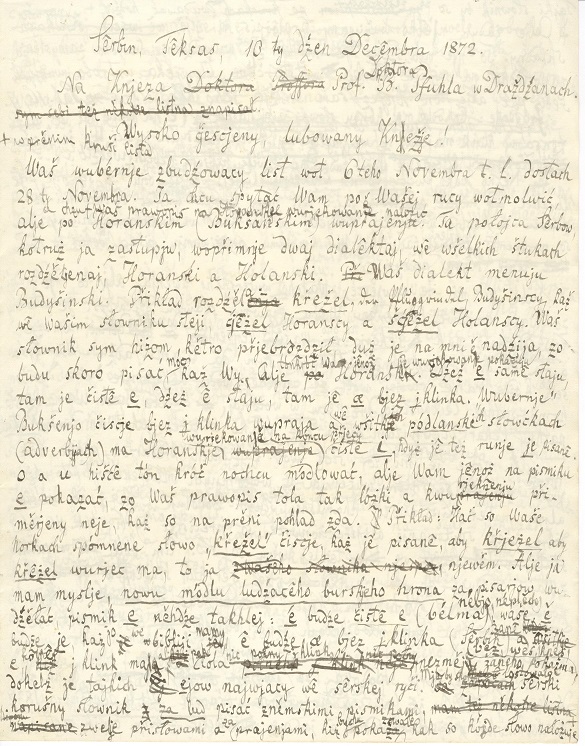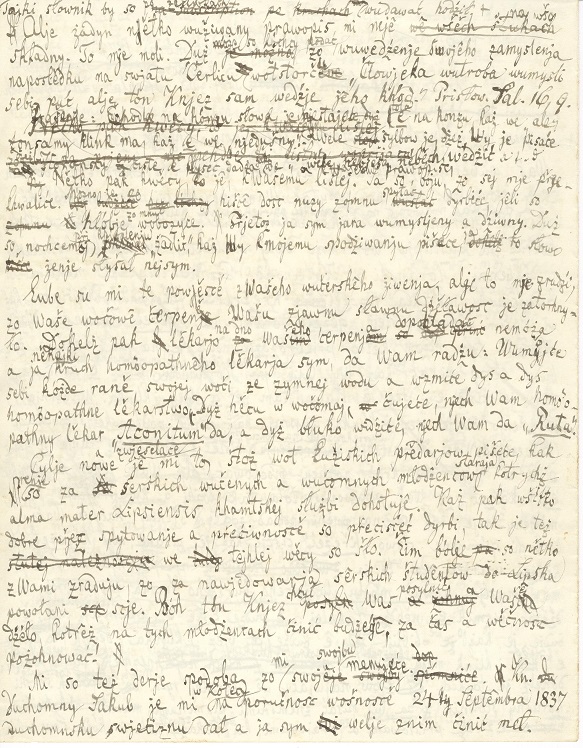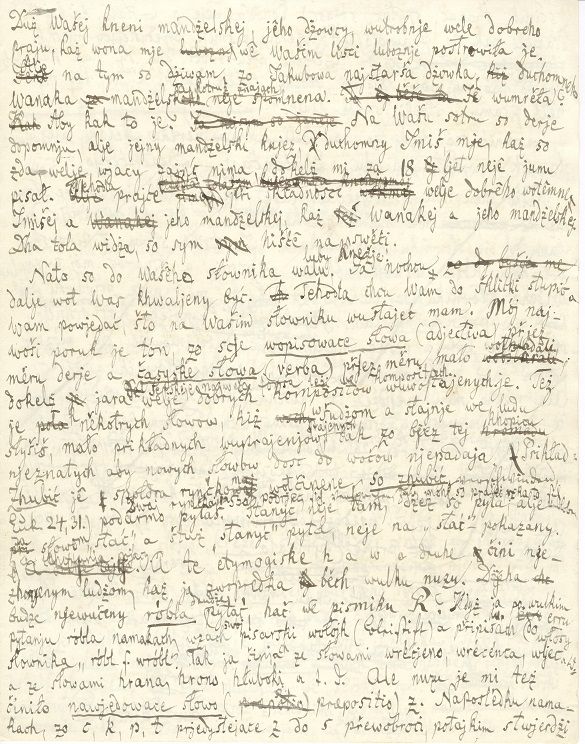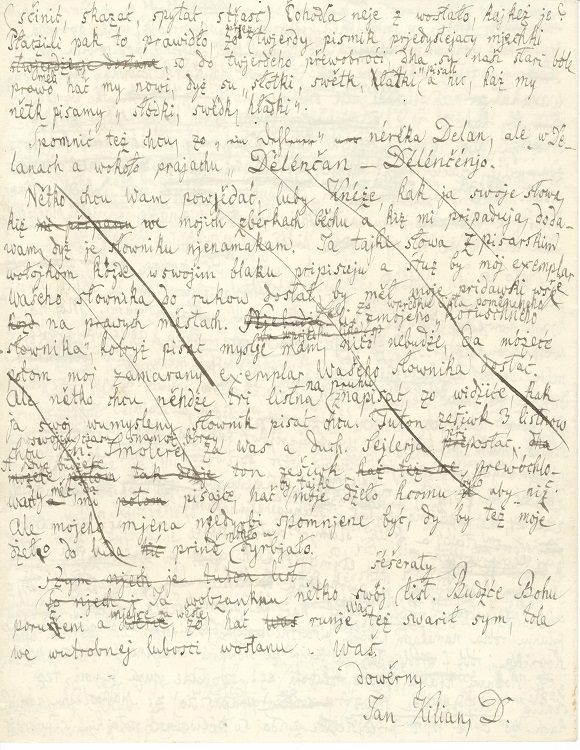Professor Pfuhl,
Dresden, Saxony, Germany
Serbin, TX, 10 December 1872
Dear Sir!
I received your inspiring letter on 28 November. I want to respond to your letter using your spelling rules, but use the pronunciation of the Upper
Lusatian specifically the pronunciation of the people in Hochkirch. Half the Wendish whom I represent, speak two dialects. In a number of areas they
are different from one another, the Upper Lusatian dialect and the Lower Lusatian dialect. I call your dialect the Bautzener.
Here is an example to show the difference: *kreel Pfluegwinkel;
In Bautzner dialect, is as described in your dictionary;
In Upper Lusatian dialect is čjeel.
In Lower Lusatian dialect is cjeel.
I have already studied your dictionary very carefully. I hope I will be able to write the way you do. This time I will write with the Upper Lusatian
pronunciation. In the place where I put a single ´e´, I mean a real e; where I put ´ě´ I mean ´jě´, but without the j the sound with
which a word or syllable begins. The people of Hochkirch pronounce the j without the initial sound. In the Upper Lusatian pronunciation, adverbs end
in a clean i, even if only written je. This time I will not consider o and u, but only show with the letter e that your spelling rules are
not easy and dont match your rules for pronunciation, though in the beginning of my study it appeared that there was harmony.
Here is an example:
I do not know if your word ´kreel´ is pronounced as spelled, or ´křjeel´, or ´křěel´. I am thinking about to write a new model of
the language of the people and the farmers who want to write. For the letter e like this: ´é´ will become a clean e, bélma, nébjo, néplěch.
Your ´ě´ will become je as it is in the Bible. è will become e without the j beginning sound of the word. Many words in the Wendish
language start with ej. I would like to write a dictionary of roots of words (Wurzelwörterbuch) for the people and use German letters and add many
proverbs and phrases, which will show, how each word is applied. Such a dictionary could be published. The spelling rules which are used at this time
cannot be applied in all cases. I do not like that. It can easily happen, that that which I am thinking will be put on the back board
(Nimmerleinstag?). In his heart a man plans his course, but the Lord determines his steps (Proverbs 16, v. 9). I have a question: Why do you not
put a je at the end of a word but a e, as it sounds like ale as e in ´njeduny´.
But now lets turn to your letter. I am afraid you praise me too much. It is possible that you have not been around me enough to deal with me. I am
pretty headstrong and peculiar. We dont want to extend the exchange of words. I am surprised you are using the word ´zadlić´- I have never heard
this word.
I enjoy reading the news about your teaching experience. I am saddened to know that your eye disease hinders your public and honorable work. As it
has not been possible for the doctors to find the cause of this disease, I can give you the following advice. I am something like a homeopathic
doctor. Here is my advice: Wash your eyes every morning with cold water. Take homoeopathic medicine when you feel heat in your eyes. The homoeopathic
doctor should prescribe Aconitum. If with that medication you cannot see clearly, then the doctor should prescribe Ruta. Totally new and delightful is
for me to read, that the Lusatian pastors are supporting the Wendish spiritual leaders and students, who are preparing for their pastoral duties at
the
alma mater Lipsiensis. But all good has to overcome temptations and hurdles just like in this situation. I am happy for you, to know
that you will be leading the Wendish students of Leipzig. The Lord may strengthen you and your work which you will tackle with your students. May the
Lord keep you and bless you forever.
I enjoyed reading about your family history. Pastor Jakob ordained me in Kotitz on Sept 24, 1837 by recommendation of the ministry. I worked with him
a lot. Best wishes to your wife, Pastor Jakobs daughter. One thing does surprise me, that the oldest daughter of Pastor Jakob and wife of Pastor
Wanak, whom I knew very well, are not mentioned. Did she die? How is she doing? I remember her sister well, but her husband, Pastor Imisch, it appears
has forgotten me. He has not written to me in 18 years. Please give my regards to Imish and Wanak. That way they will know I am still alive.
Now I will delve into your dictionary, dear Professor. I do not desire to receive any more praise from you. I will be in disfavor with you, as I will
share with you what I do not approve of in your dictionary. My strongest criticism is turned towards the fact that you paid too much attention to
adjectives and too little to the verbs. You left out a lot of composite verbs. There are several words which are used often by the people but are
represented with few examples. You can easily overlook them among the many unfamiliar and new words. Here is an example: the word ´zhubić´is
explained on half a line; so zhubić´ disappears, two others you look for in vain. ´Stanyć´ is not listed where one looks for it but finds
it under stać´; and who looks for´stanyć´ has not been guided to stać´. The etymology h and w and other letters will lead
untrained eyes into difficulty, something that happened to me at first. Where would the untrained eye search for the word ´róbl´, if not under the
letter R? When I found the word I took my pencil and put in front of the letter R in front of the word ´włosy´,´róbl´and ´Wróbl´. I did the
same with word ´wrěcenc´, ´wrěcenca´ , ´wěc´, and the words ´hrana´, ´hrono´, hłuboki´ etc. Finally I found that c, k, p, t are
changed by putting the letter z into s if it is in front of the word; for example hart becomes sčinić, skazać, spytać,
střasć. Why did z not remain z? If it is the case that a hard letter has a soft letter in front of it, the soft letter is changed
into a hard letter, then our forefathers had more of a right than we when they wrote słótki´, ´swětk´, hłatki´ (and not as we do
today ´słódki´, ´swědk´, ´hładki´). I would also like to note that a Dehlener is not a Delan but as you say in Lower Lausitz
(Niederland) is called a ´Delenčan´- ´Delenčenjo´.
(The following paragraph is crossed out by J Kilian.) Dear Sir, now I would like to report to you, how I go about adding my words which were saved in
my collection, and those which have been passed on to me provided I cannot find them in your dictionary. I pencil in each word, for example, each at
its place. When somebody takes my copy of your dictionary, he would have all additions at the correct place. If the dictionary which I plan to write
and mentioned at the beginning of this letter, will not become reality, then you could be given my copy of your dictionary with my notations. But now
I would like to take three more pages of paper and give you examples, so that you may see how I plan to set up my dictionary. I would like to mail
those three drafted pages to Mr. Schmaler, to you, and to Pastor Seiler. After you have studied the draft, please write to me and tell me if my work
is good or not. My name should not be mentioned, if my work would be printed for the people.
(End of crossed out paragraph)
I am closing my disorganized letter. The Lord be with you and be assured, that despite my criticism I will remain yours affectionately
Jan Kilian, Pastor
Serbin, Texas
[Translated by Margot Hendricks]
[* Grendel is a share beam; and a share beam is part of the plough; the share beam is the iron, the part that goes in the soil; according to the type
of soil, the share beam was shaped differently.]
Serbin, Texas, am 10. Dezember 1872
An Herrn Professor, Dr. Pfuhl in Dresden
Sehr geehrter lieber Herr!
Ihren so wunderbar inspirierenden Brief erhielt ich am 28. November dieses Jahres. Ich möchte versuchen, ihnen in ihrer Rechtschreibung zu antworten
und möchte im ersten Teil selbige aber mit der Aussprache des Oberlandes/Berglandes verbinden, speziell mit der Hochkircher Aussprache. Die Hälfte der
Sorben, die ich vertrete, umfaßt 2 Dialekte, wobei sie sich in einigen Bereichen unterscheiden, in den ´Oberländer´ und den ´Niederländer´. Ihren
Dialekt benenne ich als den ´Bautzener´.
Ein Beispiel für den Unterschied: kreel - Pfluegwinkel; im Bautzener Dialekt, wie in ihrem Wörterbuch aufgeführt; čjeel - Oberländer und
cjeel - Niederländer Dialekt. Ihr Wörterbuch habe ich schon intensiv durchgearbeitet, so daß ich hoffe, daß ich bald werde schreiben können wie sie.
Diesmal aber zeige ich ihnen nur die Oberländer Aussprache. Wo ich ein einzelnes ´e´ setze, meine ich ein richtiges ´e´, wo ich ´ě´ setze, meine
ich ´jě´, aber ohne j- Anlaut. ´Wubernje´ sprechen die Hochkircher gänzlich ohne j-Anlaut und bei allen Nebenwörtern (Adverbien) findet man in
der Oberländer Aussprache am Ende immer ein reines ´i´, wenn auch nur ´je´ geschrieben. ´o´ und ´u´ werde ich diesmal nicht betrachten, sondern nur am
Buchstaben ´e´ zeigen, daß ihre Rechtschreibung doch nicht ganz einfach ist und nicht recht an die Aussprache angepaßt ist, wie es anfangs scheint.
Beispiel: Ob ihr angeführtes Wort ´kreel´ genau wie geschrieben ausgesprochen wird, oder ´křjeel´ oder ´křěel´ zu sprechen ist, weiß
ich nicht. Ich trage mich aber mit dem Gedanken, eine neues Modell der Volks- und bäuerlichen Sprache für die zu erarbeiten, die schreiben wollen. Für
den Buchstaben ´e´ etwa so: ´é´ wird zum reinen ´e´, bélma, nébjo, néplěch; Ihr ´ě´ wird zu ´je´ wie in der Bibel und ´é´ wird zu ´e´ ohne
j-Anlaut.
weil es im Sorbischen sehr viele Wörter mit ´ej´ gibt.
Ich hätte Lust, ein ´Wurzelwörterbuch´ für das Volk zu schreiben - mit deutschen Buchstaben, mit vielen Sprichwörtern und Redewendungen, die zeigen
sollen, wie jedes Wort angewendet wird. Solch ein Wörterbuch könnte
herausgegeben werden. Aber keine Art der jetzt genutzten Rechtschreibung ist für
alles verwendbar. Das stört mich. So kann es leicht passieren, daß ich das, was ich mir ausdenke, auf den St. Nimmerleinstag verschiebe. ´Des Menschen
Herz denkt sich einen Weg aus, der Herr selber aber führt seinen Lauf´. Sprichwort Sal. 16, 9. Frage: Warum setzen sie an das Ende des Wortes kein
´je´, aber ´e´, da es wie in ´ale´ ebendiesen ´klink´ hat, wie ´e´ in´njeduny´.
Nun aber zur Sache, d.h., zu ihrem Brief. Ich befürchte sie loben mich über Gebühr. Möglicherweise haben sie noch nicht genug mit mir ausgestanden,
wenn sie sich mit anlegen. Denn ich bin ziemlich eigensinnig und eigenartig. Doch wir wollen den Disput hier nicht weiter verlängern, wie sie
(´zadlić´) zu meiner Verwunderung schreiben - dieses Wort habe ich noch nie gehört.
Sehr lieb sind mir ihre Nachrichten aus ihrem Lehrerleben. Eines aber betrübt mich, nämlich, daß ihr Augenleiden ihre öffentliche ehrenvolle Arbeit
behindert. Da die Ärzte leider nicht den Grund für ihr Leiden erkennen, ich aber so etwas wie ein Homöopath bin, rate ich ihnen: Waschen sie ihre
Augen allmorgentlich mit kaltem Wasser und nehmen sie dann und wann homöopathische Arzenei; wenn sie Hitze in ihren Augen fühlen, sollte ihnen ein
Homöopath ´Aconitum´ verschreiben, und wenn sie verschwommen sehen, möge er ihnen ´Ruta´ verschreiben. Völlig neu und erfreulich ist für mich, was sie
über die Lausitzer Geistlichen schreiben, wie gut sie sich um die sorbischen Gelehrten und Lernenden kümmern, die an der Alma Mater Lipsiensis auf ihr
Priesteramt vorbereitet werden. Aber alles Gute muß auch Versuchungen und Hindernisse überwinden, ebenso in dieser Sache. Umso mehr freue ich mich nun
mit ihnen, daß man sie zum Leiter der sorbischen Studenten in Leipzig berufen hat. Der Herr möge sie und ihre Arbeit bestärken, die sie mit den
Studenten leisten werden, und für immer und ewig segnen.
Mir gefällt auch, daß sie mir ihre Familie vorstellen. Der Pfarrer Jakub hat mich in Kotitz auf Empfehlung der Obrigkeit am 24. September 1837
ordiniert und ich hatte viel mit ihm zu tun. Somit sage ich ihrer Gattin, seiner Tochter, alles Gute, so wie sie auch mich in ihrem Brief grüßen ließ.
Eines aber verwundert mich - daß die älteste Tochter Jakubs und Gattin der Pfarrers Wanak, die ich gut kannte, nicht erwähnt wird. Ist sie verstorben?
Oder was ist mit ihr? An ihre Schwester erinnere ich mich gut, aber ihr Gatte, Pfarrer Imisch hat mich, wie es scheint, wohl vergessen, da er mir in
den letzten 18 Jahren nicht einmal geschrieben hat. Deshalb grüßen sie Imisch und seine Gattin und Wanak und Gattin bitte von mir. So erfahren sie
wenigstens, daß ich noch auf der Welt bin.
Nun stürze ich mich aber auf ihr Wörterbuch, lieber Herr. Ich möchte nicht weiter von ihnen gelobt werden. Deshalb will ich bei ihnen in´s
Fettnäpfchen treten und ihnen sagen, was ich an ihrem Wörterbuch auszusetzen habe. Meine stärkste Kritik richtet sich darauf, daß sie Adjektive zu
gut, Verben aber zu kurz betrachten, da sie eine Menge Komposita ausgelassen haben. Es finden sich auch mehrere Wörter, die man im Volk häufig überall
hört, die mit wenig Beispielen belegt sind, so daß man sie unter den vielen unbekannten und neuen Wörtern übersehen kann. Beispiel: ´zhubić´ wird
mit einer halben Zeile abgetan, ´so zhubić´ - verschwinden, zwei
sucht man vergeblich. ´Stanyć´ steht nicht da, wo man es sucht, sondern
unter ´stać ´; und wer ´stanyć ´ sucht, wird nicht auf ´stać ´ verwiesen. Und das etymogische ´h´ und ´w´ und andere bringen ungeübte
Leute in Schwierigkeiten, so wie anfangs auch mich. Wo wird wohl ein Ungeübter das Wort ´róbl´ suchen, wenn nicht unter dem Buchstaben ´R´ ? Als ich
nach langer Suche das Wort fand, nahm ich meinen Bleistift und setzte im Buchstaben ´R´ vor dem Wort ´włosy´ ´róbl´ z. ´Wróbl´. Ebeno tat ich es
mit ´wrěcenc´, ´wrěcenca´ , ´wěc´ und den Wörtern ´hrana´, ´hrono´, hłuboki´ usw. Schließlich fand ich , daß c, k,p, t durch
voranstehendes ´z´ in ´s´ umgewandelt wird, also ´hart´ wird (sčinić, skazać, spytać, střasć

. Warum blieb ´z´ nicht ´z´? Gilt aber, daß durch einen harten Buchstaben ein vornan
stehender weicher Buchstabe in einen harten umgewandelt wird, dann hatten unsere Altvorderen wohl mehr Recht, als wir, als sie ´słótki´,
´swětk´, ´hłatki´ schrieben ( und nicht wie wir heute: ´słódki´, ´swědk´, ´hładki´. Anmerken möchte ich auch, daß ´ein
dehlener´ nicht ´Delan´ heißt, sondern wie man im Niederland sagte ´Delenčan´- ´Delenčenjo´.
Crossed: Nun möchte ich ihnen, lieber Herr, berichten, wie ich meine Wörter, welche in meinen Sammlungen waren und solche, die mir zugetragen werden,
hinzufüge, wenn ich sie in ihrem Wörterbuch nicht finde. Ich füge solche Wörter mit Bleistift, jedes an seinem Platz, ein. Und wenn jemand mein
Exemplar ihres Wörterbuches in die Hände bekommt, hätte er alle Zusätze am richtigen Platz. Falls aus meinem oben erwähnten ´Wörterbuch´, welches ich
zu schreiben beabsichtige, nichts werden sollte, dann könnten sie mein verschmiertes Exemplar ihres Wörterbuches erhalten. Jetzt aber möchte ich noch
3 Seiten/Bögen zur Probe aufschreiben, damit sie sehen können, wie ich mein Wörterbuch schreiben möchte. Diese 3 Entwürfe möchte ich Herrn Schmaler,
an sie und an Pfarrer Seiler schicken. Und wenn sie die Entwürfe durchgearbeitet haben werden, schreiben sie mir bitte, ob meine Arbeit zu etwas taugt
oder nicht. Mein Name sollte aber nicht erwähnt werden, wenn meine Arbeit auch unter das Volk kommen müßte. Damit sei dieser Brief
. Crossed
paragraph ends here.
Ich schließe nun meinen ungeordneten Brief. Bleiben sie Gott befohlen und seien sie dessen gewiß, obwohl ich sie kritisierte, daß ich verbleibe in
herzlicher Verbundenheit ihr
Jan Kilian, Pfarrer
Serbin, Texas
[Translated by Martin Strauch]
Serbin, Texas, 10. decembera 1872
Na knjeza Prof. dr. B. Pfuhla w Drjedźanach
Wysoko česćeny, lubowany knjee!
Wa wuběrnje zbudźowacy list wot 6. nowembera t. l. dóstach 28. nowembera. Ja chcu spytać, wam po waej rucy wotmołwić a
chcu w prěnim kruchu lista wa prawopis na horanske wurjekowanje nałoić, ale po horanskim (Bukečanskim) wuprajenju. Ta
połojca Serbow, kotru ja zastupuju, wopřimnje 2 dialektaj, we welakich tukach rozdźělenaj, Horanski a Holanski. Wa dialekt
mjenuju Budyinski. Přikład rozdźěla kreel. - den Pfluegwinkel; Budyinscy, ka we waim słowniku steji, čjeel
Horanscy a cjeel Holanscy. Wa słownik sym hio chětro přebrózdźił, tu je na mni nadźija, zo budu skoro pisać
móc, ka wy, ale tónkróč wam jeno Horanske wurjekowanje pokauju. Hdźe ´e´ same staju, tam je čiste ´e´, hdyźe ´ě´ staju,
tam ´jě´ a bjez ´j´ klinka. ´Wubernje´ Bukenjo čisće bjez ´j´ klinka wupraja a we witkich pódlanskich słowčkach
(adwerbijach) ma Horanske wurjekowanje na kóncu přeco čiste ´i´, hdy jě te runje ´je´ pisane. ´o´ a ´u´ hiće tón króč
nochcu módlować, ale wam jeno na pismiku ´e´ pozać, zo wa prawopis tola tak lóki a k wurjeknjenju přiměrjeny njeje, ka so na
prěni pohlad zda. Přikład: Hač so wae horjeka spomnjene słowo ´křeel´ čisće, ka je pisane, abo
´křjeel´ abo ´křěel´ wurjec ma, to ja njewěm. Ale ja mam mysle, nowu módlu ludźaceho burskeho hrona za pisarjow
wudźěłać, pismik ´e´ něhdźe takle: ´é´ budźe čiste ´e´ (bélma, nébjo, néplěch), wae ´ě´ budźe
´je´, ka jo w bibliji mamy, ´è´ budźe ´e´ bjez ´j´ klinka (
)
, dokel je tajkich ejow najwjacy w serbskej ryči. Mje by lotowało,
koruny słownik za lud pisać z němskimi pismikami, z wjele přisłowami a zaprajenjemi, ki budu pokazować, kak so kóde
słowo nałouje. Tajki słownik by so
wudać hodźał. Ale adyn nětko wuiwany prawopis mi njeje na wo składny.
To mje moli. Tu móe so lochce podać, zo wuwjedźenje swojeho zamyslenja naposledku na swjatu čerlicu wotstorču.
Čłowjeka wutroba wumysli sebi puć, ale tón Knjez sam wjedźe jeho chód. Přisł. Sal. 16, 9. Praenje: čehodla na
kóncu słowa je njestajeće, tola ´e´ na kóncu, ka w ´ale´ tón samy klink ma, ka e w `njeduny´
. Nětko pak k wěcy, to je, k
waemu listej. Ja so boju, zo sej mje přechwaliće. Móno je,
hiće dosć nuzy ze mnu spytać dyrbiće, jeli so hłóbje
ze mnu wobozyće. Přeto ja sym jara wumysleny a dźiwny. Tu so nochcemoj při
´zadlić´, ka wy k mojemu spodźiwanju
pisaće, ja to słowo enje słyał njejsym.
Lube su mi te powěsće z waeho wučerskeho iwjenja, ale to mje zrudźi, zo wae wočowe ćerpjenje wau zjawnu sławnu
dźěławosć je zatorhnyło. Dokel pak lěkarjo na dno waeho ćerpjenja dopohladać njemóa a ja někajki
kruch homöopathneho lěkarja sym, da wam radźu: Wumyjće sebi kóde ranje swojej woči ze zymnej wodu a wzmiće hdys a hdys
homöopathne lěkarstwo, hdy hěcu we wočomaj čujeće, njech wam homöopathny lěkar ´Aconitum´ da, a hdy błuko
widźiće, njech wam da ´Ruta´. Cyle nowe a zwjeselace je mi to, to wot Łuiskich prědarjow pisaće, kak rjenje so za
serbskich wučenych a wučomnych młodźencow staraja, kotrych alma mater Lipsiensis k hamtskej słubje dohotuje. Ka pak witko
dobre přez spytowanje a přećiwnosće so přećićeć dyrbi, tak je te w telej wěcy so lo. Čim bóle so
nětko z wami raduju, zo za nawjedowarja serbskich studentow do Lipska połowani sće. Bóh tón Knjez chcył was posylnić a wae
dźěło, kotre na tych młodźencach činić budźeće. Za čas a wěčnosć poohnować.
Mi so te derje spodoba, zo mi swoju swójbu mjenujeće. Knjez duchowny Jakub je mi w Kotecach na poručenosć wynosće 24.
septembera 1837 duchownsku swjećiznu dał a ja sym wjele z nim činić měł. Tu waej knjeni mandźelskej, jeho
dźowcy, wutrobnje wjele dobreho praju, ka wona mje we waim lisće luboznje postrowiła je. Ale na tym so dźiwam, zo Jakubowa
najstara dźowka, duchowneho Wanaka mandźelska, kotru derje znajach, njeje spomnjena. Je wumrěła? Abo kak to je? Na wau sotru so
derje dopomnju, ale jeje mandźelski, knjez duchowny Imi mje, ka so zda, wjele wjacy zańć nima, dokel mi za 18 lět njeje jónu
pisał. Tohodla prajće při składnosći wjele dobreho wot mje Imiej a jeho mandźelskej, ka Wanakej a jeho
mandźelskej. Dha tola widźa, zo sym hiće na swěće.
Na to so do waeho słownika walu, luby knjee. Ja nochcu dale wot was chwaleny być. Tohodla chcu wam do klitki stupić a wam
powědać, to na waim słowniku wustajeć mam. Mój najwyi porok je tón, zo sće wopisowace słowa (adjektiwa) přez
měru derje a časyskesłowa (werba) přez měru mało wobhladali, dokel jara wjele dobrych kompositow wuwostajenych je. Te
je někotrych słowow, ki wudźom a stajnje w ludźe słyi, mało přikładnych wuprajenjow stajenych, tak zo bjez
tej kopicu njeznatych abo nowych słowow dosć do wočow njepadaja. Přikład: zhubić je z połdra rynčkom
wotčinjene, so zhubić - verschwinden , dwaj
podarmo pyta. Stanyć njeje tam, hdyźe so pyta, ale za słowom ´stać´ , a
tó stanyć pyta, njeje na ´stać´ pokazany. A te etymogiske ´h´ a ´w´a druhe čini njezhonjenym ludźom, ka ja zwotprědka
běch, wulku nuzu. Hdźe da budźe njewučeny róbla pytać, hač w pismiku R? Hdy ja po wulkim pytanju ´róbla´ namakach,
wzach swój pisarski wołojk (Bleistift) a připisach w ´erru´ do ´włosy´słownika ´róbl´ z. ´wróbl´. Tak ja činjach ze
słowami ´wrěcenc´, ´wrěcenca´, (prepositio) ´z´ . Naposledku namakach, zo c, k, p, t prjedystejace ´z´ do ´s´ přewobroći,
potajkim stwjerdźi. (sčinić, skazać, spytać, střasć

. Čehodla njeje ´z´ wostało, kajke je? Płaći-li pak to prawidło, zo přez twjerdy pismik prjedystejacy
mjechki so do twjerdeho přewobroći, dha su nai stari bóle prawo měli, hač my nowi, hdy su ´słótki, swětk, łatki´
pisali (a nic ka my nětk pisamy: ´słodki, swědk, hładki´.
Spomnić te chcu, zo´ein dehlener´ njerěka ´Delan´, ale ´w Delanach´ a wokoło prajachu ´Delenčan´ - Delenčenjo´.
Crossed: Nětko chcu wam powědać, luby knjee, kak ja swoje słowa, ki w mojich zběrkach běchu, a ki mi připaduja,
dodawam, hdy je w słowniku njenamakam. Ja tajke słowa z pisarskimwołojkom kóde w swojim blaku připisuju a tó by mój eksemplar
waeho słownika do rukow dóstał, by měł moje přidawki wě na prawych městnach. Jeli-zo z mojeho w prědku lista
´
słownika´, kotry pisać mysli mam, ničo njebudźe, da móeće potom mój zamazany eksemplar waeho słownika dóstać.
Ale nětko chcu něhdźe tři listna na pruhu napisać, zo widźiće, kak ja swój wumysleny słownik pisać chcu.
Tutón zeiwk 3 lisćow chcu knj. Smolerjej za was a duchowneho Zejlerja připósłać. A hdy budźeće tón zeiwk
přewóchlowty měć, mi pisać, hač by tajke moje dźěło k čemu było abo nic. Ale moje mjeno njedyrbi
spomnjene być, hdy by te moje dźěło do luda přinć móhło a dyrbjało.
Z tym njech je tutón list
(end crossed)
Ja wobzamknu nětko swój eeraty list. Budźće Bohu poručeni a mejće za wěste, hačrunje was te swarił sym,
tola we wutrobnej lubosći wostanu
Wa dowěrny Jan Kilian, d.
[Transliterated by Martin Strauch]



